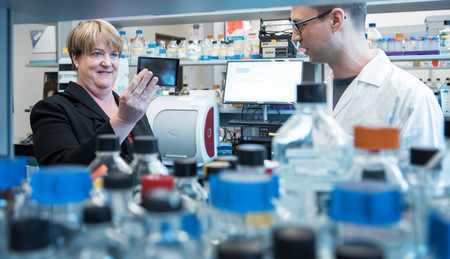
Cathy McLeod, Parliamentary Secretary to the federal Minister of Health, takes a tour of Natalie Strynadka’s lab April 13.
The Faculty of Medicine is receiving three of six grants from the Canadian Institutes of Health Research that are aimed at developing new approaches to antimicrobial resistance.
The grants, announced April 13 at UBC by Cathy McLeod, Parliamentary Secretary to the Minister of Health, are aimed at finding new targets for antimicrobial drug development, new approaches to treating drug-resistant bacterial infections, and strategies for preserving the effectiveness of existing antibiotics. The monies are part of Canada’s contribution to a 19-country consortium on antimicrobial resistance.
“Innovation is one of the key components of the Government of Canada’s framework for addressing the global health issue of antimicrobial resistance,” McLeod said. “Today’s announcement shows how Canadian researchers are contributing at the international level. Their work will benefit Canadians and people around the world.”
Bacteria, viruses, fungi and parasites are increasingly evolving in ways that enable them to evade antimicrobial medicines. While antimicrobial resistance happens naturally, a major contributor is the overuse and misuse of antibiotics and other antimicrobial medicines. The loss of effective antimicrobials is reducing our ability to protect Canadians from infectious diseases, with profound impacts on health care, global trade, agriculture, environment and health sectors.
Natalie Strynadka, a Professor in the Department of Biochemistry and Molecular Biology, is receiving two $509,000 grants: one to develop new approaches to inhibit peptidoglycan cross-linking as a target for antibacterial drug development, and another to find ways of protecting the effectiveness of beta-lactam antibiotics (a class of antibiotics that includes penicilin) by finding and developing molecules to prevent their inactivation.
Dr. Styrnadka, who noted that antimicrobial resistance threatens every corner of the world, said her lab produces ultra-resolution atomic pictures — “Literally, we observe each atom in these molecules — data that illuminates the critical molecular underpinnings of how pathogenic bacteria function, infect their hosts, and resist current antibiotics.” The resulting “blueprints” enables researchers to design new drugs that bind and disarm bacteria, said Dr. Strynadka, the Canada Research Chair in Antibiotic Discovery and Medicine.
Horacio Bach, an Adjunct Professor in the Division of Infectious Disease, is co-recipient of a $298,000 grant with Urs Hafeli, an Associate Professor in the Faculty of Pharmaceutical Sciences. They will investigate the mechanism of eradicating multi-drug resistant bacteria using organic and inorganic compounds and protein nanoparticles.
Another UBC faculty member, Charles Thompson, a Professor in the Department of Microbiology and Immunology, will be receiving a $600,000 grant to develop a new strategy for treating drug-resistant tuberculosis using a multiple target approach.
Also, Julian Davies, Professor Emeritus in Microbiology and Immunology, and Raymond Andersen, a Professor in the Department of Chemistry, will be collaborating on a project led by McMaster University that received $1.5 million.
McLeod, who was a nurse before entering public service, remembers tending to children brought to her rural emergency department in the middle of the night with ear infections.
“Which of course we treated with antibiotics,” she says. “But we now realize that perhaps that might have been contributing to the problem. It was what was known as ‘best practice’ at the time, but perhaps many of those ear infections would have gotten better on their own.”
“Canadian researchers are at the leading edge of the science of antimicrobial resistance and antibiotic drug development,” said Marc Ouellette, Scientific Director, CIHR Institute of Infection and Immunity. “CIHR is proud to support their work and their participation in international collaborations focused on producing innovative solutions to this global challenge.”